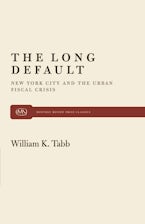In what may well have been the largest popular protest in this country of the last twenty years, more than forty thousand demonstrators in Seattle effectively shut down a World Trade Organization (WTO) conference late last year. Against the backdrop of this historic event, William K. Tabb issues a comprehensive examination of the world capitalist system at the start of the twenty-first century disputing those who see globalization as the steamroller against which the most powerful nations are helpless. It is in fact the most powerful states that have created globalization.
The Amoral Elephant examines the implications of globalization, draws parallels to earlier stages of capitalist development to demonstrate the social burdens arising from the exploding financial markets. Tabb describes how international institutions, most importantly the International Monetary Fund and the WTO have focused on neoliberal goals to erode the welfare state and shift wealth from the poor to the rich.
Tabb's reasoning is that if we better understand the world, we will be better prepared to engage in the struggle for progressive social change.


